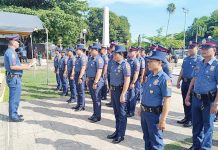
[av_one_full first min_height=” vertical_alignment=” space=” custom_margin=” margin=’0px’ padding=’0px’ border=” border_color=” radius=’0px’ background_color=” src=” background_position=’top left’ background_repeat=’no-repeat’ animation=”]
[av_heading heading=’ NO SEGREGATION, NO COLLECTION DENR-6 presses stricter Iloilo garbage policy’ tag=’h3′ style=’blockquote modern-quote’ size=’30’ subheading_active=’subheading_below’ subheading_size=’15’ padding=’10’ color=” custom_font=”][/av_heading]
[av_textblock size=” font_color=” color=”]
Monday. September 25, 2017
[/av_textblock]
[av_textblock size=” font_color=” color=”]
ILOILO City – The city government should come up with a stricter policy on garbage collection, according to the Department of Environment and Natural Resources (DENR) in Western Visayas.
“There should be no collection if the wastes are not properly segregated,” stressed Regional Director Jim Sampulna.
The city government has contracted a private hauler to collect the city’s garbage but it is unclear if the latter is familiar with Section 21 of Republic Act 9003 or the Ecological Solid Waste Management Act.
This section made mandatory the segregation of waste – recyclable, non-recyclable, biodegradable, non-biodegradable – at the point of origin such as households, institutions, commercial establishments, industries and farms.
“We need to teach households how to properly segregate waste. We believe that segregation-at-source is the best way to clean our environment,” said Sampulna during a recent meeting in preparation for a region-wide information and education campaign on ecological solid waste management (ESWM) that will kick off in this city.
The Ecological Solid Waste Management Act defines segregation at source as a “solid waste management practice of separating, at the point of origin, different materials found in solid waste in order to promote recycling and re-use of resources and to reduce the volume of waste for collection and disposal.”
Source-separated discards are resources that can be reused or recycled back into commerce or Mother Nature, according to EcoWaste Coalition, a public interest network of community, church, school, environmental and health groups pursuing sustainable solutions to waste, climate change and chemical issues in the country.
In an ESWM campaign in Boracay Island, Malay, Aklan in July, DENR Region 6 stressed the need to segregate wastes and properly disposed them. As a result, said Sampulna, there was heightened awareness on the importance of waste segregation among residents and businessmen in the island.
The same strategy, according to the director, can be replicated in the city of Iloilo.
In a 2009 survey, the EcoWaste Coalition, identified key stumbling blocks in the implementation of waste separation at source. These were the following:
- low public awareness on Republic Act 9003
-
lack of sustained public education and mobilization on eco-friendly consumption and discards management
-
non-enforcement of both the “no segregation, no collection” policy and the “segregated collection” policy
-
predisposition of some officials to quick-fix “solutions” such as landfills and incinerators
-
laziness of some officials and the absence of political will to execute the law
-
corruption in waste management given the huge budget allocation for waste collection and disposal./PN
[/av_textblock]
[/av_one_full]



